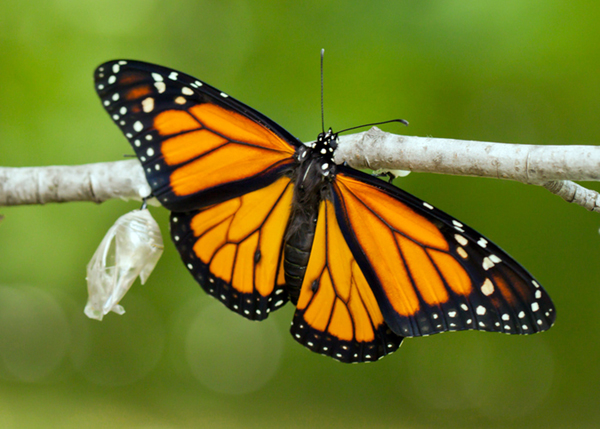- South Texas Students Meet Accordion Music Icons Los Tigres Del Norte In Edinburg Thanks To Khs America/Hohner Alianza Académica Initiative
- Fragile Planet Offers a Nighttime Wildlife Experience
- Falcons Soccer Off & Running
- Cameron County Receives Funds to Improve Two Parks
- Falcons Complete First Half of 32-6A
- School District to Help out Victims of California Wildfires
- Sand Castle Days Continued Despite Unexpected Weather
- Ready for District
- Discussion of Garbage Dumpster Rates, Agreements Between State & City on Highway Regulations, and More
- 31st Annual Shrimp Cook-Off is Right Around the Corner
Garden Network Aims to Preserve Endangered Butterflies and Bees
- Updated: November 3, 2017

A Monarch butterfly, newly emerged from its chrysalis, stretches its wings in preparation prepare for its annual migration from Mexico to Canada. Photo: GettyImages
by Mark Richardson
SAN ANTONIO, Texas – If you’ve ever watched the process of a caterpillar becoming a colorful Monarch butterfly, you’ll likely appreciate the challenge being issued by the National Pollinator Garden Network.
The Million Pollinator Garden Challenge calls on everyone – from horticulture professionals to schoolchildren and volunteers – to help create and register one-million pollinator gardens by year’s end.
Butterflies and bees have been in extreme decline in recent decades, and Mary Phillips, the senior director of the National Wildlife Federation’s “Garden for Wildlife” program, says Monarch populations, normally seen on their annual migration through south Texas, have plummeted 90 percent in the last 20 years.
“Monarchs are something people identify,” she says. “It’s an iconic butterfly that many of us have experienced in our childhood. So, that’s been an amazing motivator to get people to focus and engage around the pollinator issue.”
Officials in San Antonio recently re-affirmed their commitment to preserving Monarchs and other species. They’re developing pollinator-friendly gardens at 24 sites across the city. Scientists say habitat loss, parasites and pesticides are among the causes of pollinator declines.
Phillips notes that a Cornell study found one-third of all the food we eat is the direct result of pollinators.
She says the Garden for Wildlife program helps not only insects and animals but also gives people a daily connection to the natural world, whether they create a garden in the city or the country.
“It’s very small to very big,” she adds. “Some of these are creating tremendous acres of habitat and others are kind of connecting corridors across urban settings. So, both of those approaches are equally valuable.”
Million Pollinator Garden Challenge participants can learn more, register their gardens and take a look at the Challenge Map online at pollinator.org.
